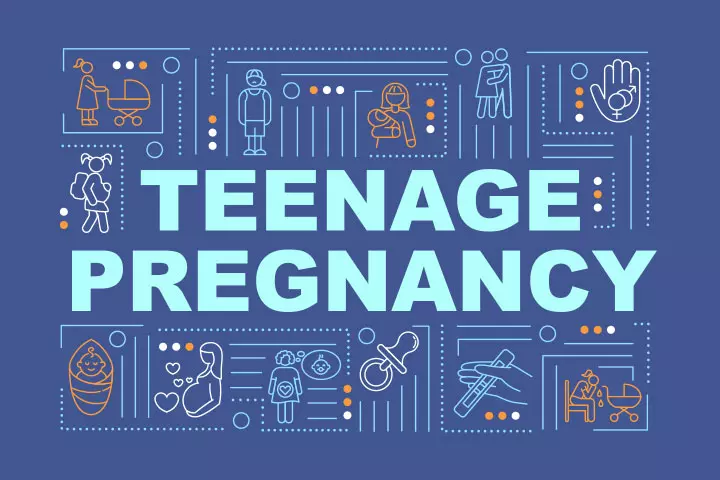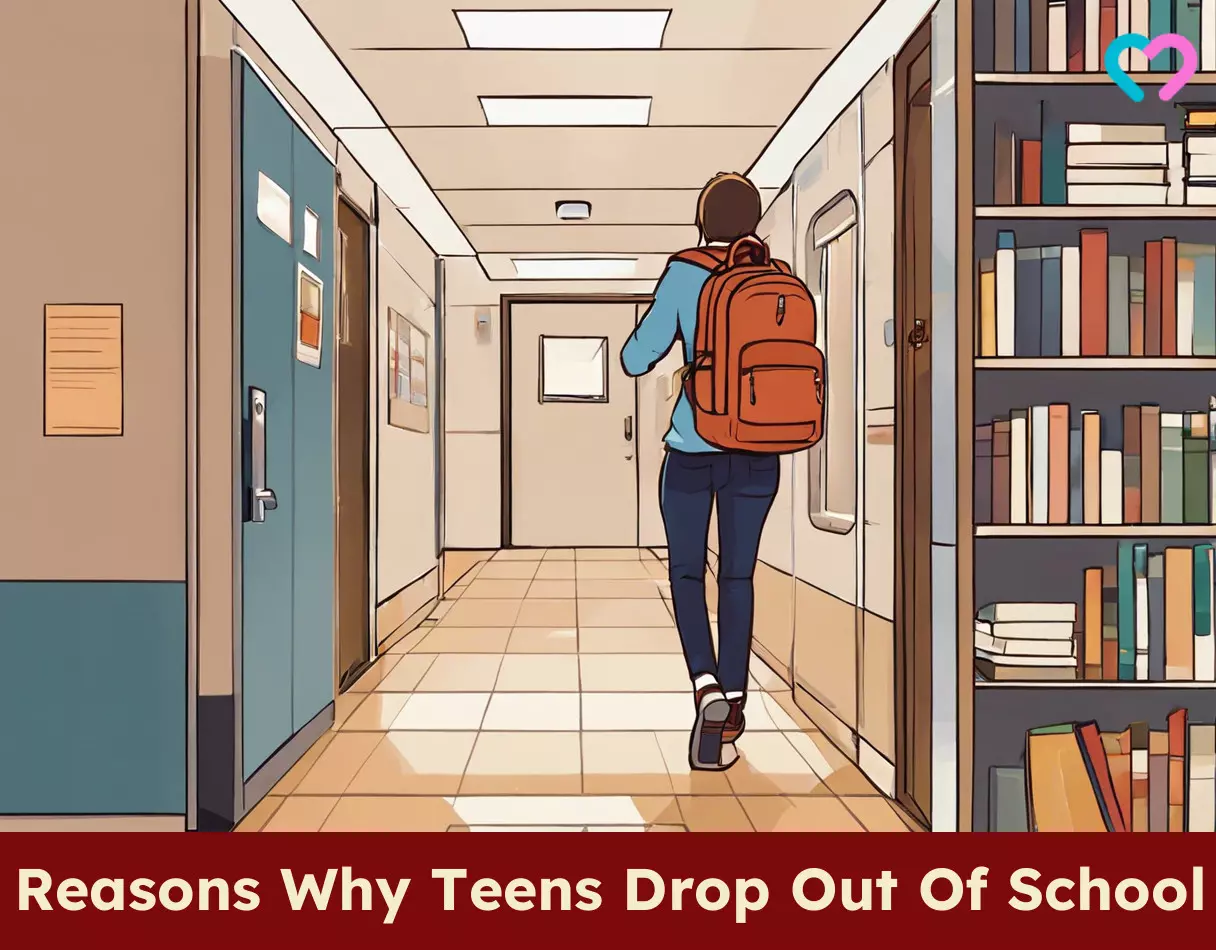
Image: Shutterstock

Teenage is a sensitive period of life. There are many complex reasons teenagers could quit school. It is important to understand these reasons so that parents, teachers, and policymakers can develop interventions to support students who are at risk. The future of your teen depends on their academic performance and their all-around development in these early years. But teens quitting school is a stark reality. Teens deal with depression, anxiety, peer pressure, and many other issues. If left unattended, they can pile up into other major mental health issues that force them to drop out. As a parent, if you are worried about your teen struggling with school or friendships, it could be a smart idea to intervene and help them before they decide to drop out or quit school. If you wish to know some of the major reasons why teens drop out of school, this article is for you.
Key Pointers
- Teenage years can be confusing and troublesome due to hormonal and physical changes.
- Understanding and providing a safe space for teenagers to confide in can be helpful.
- Bad habits like substance abuse can hinder teenagers’ progress and are common.
- External factors like bullying, physical abuse, and economic hardship can negatively affect teenagers’ progress.
Why Do Teens Drop Out Of School?
Here is a list of the top eight reasons to the question why teens drop out of high school:
1. Alcohol and substance abuse
A lot of teenagers leave school and studies owing to drug addiction and substance abuseiA harmful pattern of consuming psychoactive substances, such as drugs or alcohol, illicit drugs, or prescription drugs. . Alcohol addiction is also another reason that explains why teenagers drop out of school.
 Point to consider
Point to consider2. Pregnancy

Image: IStock
Owing to the lack of parental supervision and emotional security many teenagers experiment with physical intimacy. Teen pregnancy is another major reason that leads to the termination of studies at a tender age.
3. Loss of interest

Image: IStock
Some teenagers develop a lack of interest in academics owing to several factors. Wealthy kids from rich families may feel less inclined to complete their studies. Some teens may quit their studies to pursue their passion for art and acting. The lure of fame and money becomes stronger as popular media greatly influences teenagers.
4. Economic hardship
In several developing countries, poverty forces a lot of teenagers to drop out of school. At times, teens who are good students and want to pursue higher studies fail to do so because of economic hardship. Financial difficulties may force them to quit education, explore alternative education options, or take up jobs to support their family. However, they will be unable to work and make a living while attending school, so they drop out.
5. Bullying

Image: IStock
Many teenagers leave school due to factors that sometimes remain mysterious to teachers or even parents. One such reason can be bullying by peers. Students with physical deformities or lack of abilities are often a subject of bullying at school. Such children develop an inferiority complex and eventually drop out of school. Being bullied constantly at school makes the experience unpleasant, uncomfortable, and at times unsafe, so instead, they choose to drop out to avoid it.
Sarah Anne, a lifestyle vlogger, cites many reasons behind her decision to drop out of high school at 16. However, she speaks at length about how bullying was one of the primary reasons for her to drop out of high school. She says in her YouTube video, “I was being bullied a lot, too; kids were horrible. I was the target of this dude, and anytime he would see me, it was like something went off in his head, and it was like, ‘I need to make fun of that one.’ I was the fat one out of my friends, and I was always getting picked on… I can absolutely remember what that felt like as a 16-year-old; it was so hard. I was self-harming as well because I did not think anything was going to get better for me (i).”
6. Sexual abuse
Some teenagers even face sexual molestation by teachers. The victim may find it hard to discuss this with others. Such a traumatic incident can take a toll on their academic performance and may make them quit their studies. They may have PTSD (post-traumatic stress disorder)iA mental and behavioral disorder resulting from exposure to a traumatic event or experience. and may be triggered by being on school property and seeing that teacher.
7. Special disorders
Some children are not handicapped or physically disabled. However, as teenagers they may develop certain disorders like dyslexiaiA learning disorder that may cause issues with reading and writing, and spelling. or ADHDiA neurodevelopmental disorder affecting the child's ability to pay attention, control impulses, and manage energy levels. . Teens who are suffering from these conditions often fail to focus on studies. Sometimes, the underlying problem may go undetected both by the teachers and parents, and the teens may face criticism for their poor performance at school. A lack of empathy and an inability to surpass their academic struggles may make them drop out.
 Point to consider
Point to consider8. Family problems and violence

Image: IStock
Sometimes, teens end up bearing the brunt of family violence and divorce. Teens from broken families often find it hard to focus on their studies, pursue higher education, and get good employment opportunities.
9. Academic failure
Academic failure can significantly impact teenagers, potentially leading them to quit school. This outcome often stems from a complex interplay of factors triggered by poor academic performance. Repeated failures can diminish teenagers’ self-confidence, making them feel incapable of succeeding academically. The social stigma attached to failing can intensify feelings of embarrassment and isolation among peers, further discouraging continued attendance. The pressure to perform academically can cause significant teen stress, potentially leading to anxiety, depression, and other mental health issues that make school attendance challenging (1). Lastly, a lack of support from parents or teachers can worsen feelings of alienation and hopelessness, making quitting school more appealing.
What Are The Consequences Of Teens Dropping Out Of School?
Dropping out of school can affect various aspects of a teen’s life.
- It can lead to limited career opportunities and even unemployment. Individuals who have passed their high schools tend to have better career opportunities than dropouts.
- Dropping out can reduce earning potential. Thus, leading to financial instability.
- It has been seen that dropping out of high school often leads to an involvement in high-risk teenage behaviors such as early pregnancy, premature sexual activity, violence, alcohol, and drug abuse (1).
- If an individual drops out of high school, they may not be issued a driving license or an employment certificate in some countries, which may hinder personal and professional growth.
The effects of dropping out of school can cause issues beyond individual challenges. Often, these drop-outs contribute to a cycle of poverty and unemployment. They are also dependent on social services, which affects the stability and economic growth of the community. However, it is important to note that there are several dropout prevention programs and support systems, which students can utilize to complete their education.
How To Prevent Teens Dropping Out Of School?
The issue of teens dropping out of school can be prevented by implementing practical measures.
- Mentorship programs can pair vulnerable students with positive role models. These mentors can guide and support teens.
- Encouraging open and non-judgmental communication can help address issues early. These communications should be honest and should happen between parents, teachers, and teens regularly.
- Regular tuition and after-school programs can help struggling students and address their weak points effectively. These programs can include personalized learning aids to help teens overcome obstacles and achieve good grades.
- Identifying challenges early is also a good step in aiding potential student drop-outs. Teachers and counselors can have regular sessions with teens to identify signs of social, emotional, economic, or academic difficulties.
- A supportive environment at home and school helps teens feel heard and connected. They feel free to approach the right authorities with their issues and have the confidence that the issues will get resolved.
- Career counseling can motivate teens to stay in school. Schools can run programs that focus on practical skills and internships that allow teens a glimpse into the real world.
Frequently Asked Questions
1. Is dropping out of high school a good idea?
Dropping out of high school is not a good idea because dropouts have limited job opportunities and a higher risk of being associated with criminal activities (1). High school dropouts also give little importance to growing in a specific career path. Furthermore, they may miss out on several invaluable and life-reforming experiences in high school.
2. Is dropping out of school Illegal?
In the US, most states require students to attend school till they turn 16. Further, based on state laws, students above 16 may need consent from their legal guardians to drop out of school to avoid potential legal problems (2).
3. What resources are available to help teenagers struggling with school and considering dropping out?
Several resources are available to help teenagers struggling with school and considering dropping out. Start by speaking with your school counselor or seek tutoring services or academic support programs offered by your school or local community organizations. Reach out to community organizations that offer resources for struggling students and utilize online resources like educational websites, virtual tutoring platforms, or interactive learning tools.
4. What alternative education options are available for teenagers who have dropped out of school?
Several alternative education options are available for teenagers who have dropped out of school. Many communities offer adult education programs that provide classes and support for individuals seeking to complete their high school education. Vocational training programs focus on developing specific job-related skills. Numerous online platforms and virtual schools offer accredited courses and programs for students of all ages.
5. What role do schools play in preventing dropouts?
Schools can help by offering extra academic support and creating a safe and happy environment. Moreover, by running programs to aid academically- or economically-weak students, they can keep teens interested and prevent dropouts. Schools can also have regular counseling and interactive sessions with teens to reach out to those who are struggling and help them overcome obstacles.
School education is essential to building a foundation for any career. However, media influence, desire to pursue their passion, substance abuse, or bullying can be why teenagers quit school. As a parent, you need to listen to their problems, help them understand the pivotal role of education, and chalk out a way to motivate them to complete their schooling. Try identifying signs of psychological disorders, general health problems, or mental health issues that may be the root cause of poor performance in school and offer practical help or secure them the professional support they may need. If they have trouble with academics, try to learn how to motivate a teenager to study. Avoid being judgemental, and support your child by addressing their concerns.
Infographic: Common Reasons For Dropping Out Of High School
Teens may consider dropping out of school for various reasons. Therefore, parents, teachers, and community members need to be aware of these issues and work together to support teens in staying and completing their education. The following infographic illustrates some common reasons for teens quitting school.

Illustration: Momjunction Design Team
Illustration: Reasons Why Do Teens Drop Out Of School

Image: Stable Diffusion/MomJunction Design Team
Personal Experience: Source
MomJunction articles include first-hand experiences to provide you with better insights through real-life narratives. Here are the sources of personal accounts referenced in this article.
i. Dropping out of high school at 16 & what it taught me.https://www.youtube.com/watch?feature=shared&t=253&v=IZAgzBOHC4c
References
- Ying Zhao et al.; (2025); Self-Esteem and Academic Engagement Among Adolescents: A Moderated Mediation Model.
https://www.frontiersin.org/journals/psychology/articles/10.3389/fpsyg.2025.690828/full - Consequences of dropping out of school
https://crfcap.org/images/pdf/7B%20DocPack.pdf - 6 Reasons Why You Should Care About High School Dropout Rates.
https://www.theedadvocate.org/6-reasons-why-you-should-care-about-high-school-dropout-rates/ - Free and compulsory school age requirements.
https://www.ecs.org/clearinghouse/01/18/68/11868.pdf
Community Experiences
Join the conversation and become a part of our nurturing community! Share your stories, experiences, and insights to connect with fellow parents.
Read full bio of Dr. Holly Schiff
Read full bio of Harshita Makvana
Read full bio of Deepa Thomas
Read full bio of Kavita Kankani
















